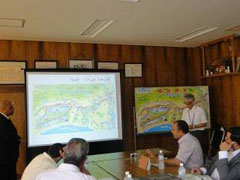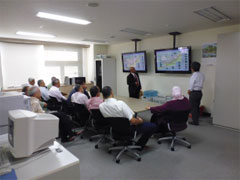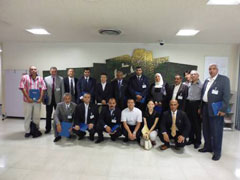- Home
- Technical Cooperation Projects
- Index of Countries
- Middle East
- Egypt
- Project for Strengthening Water Management Transfer
- Project News
- Training Course "The Participatory Water Management in Japan" successfully completed
Project News
2013-09-02
Training Course "The Participatory Water Management in Japan" successfully completed
As a part of the SWMT project, the training course "The Participatory Water Management (PWM) in Japan" was successfully completed from August 16th to 30th. 12 The staff of Ministry of Water Resources and Irrigation (MWRI) and the member of water users' organization (WUO) participated in this course and acquired a lot of knowledge on Japanese water management.
Japanese experts of SWMT project and counterparts such as MWRI and WUO members have been looking for the system of participatory water management most suitable for Egypt. Japanese experts' suggestion and advice are based on the experience and knowledge of PWM in Japan. Therefore, for fruitful discussion between Japanese experts and counterparts and reaching the best conclusion, the counterparts' deep understanding of PWM in Japan is necessary.
The system of PWM in Japan has been formulated with long time and deeply affected by Japanese culture, livelihood, and historical background. Additionally, the national, prefectural and municipal governments and Land Improve Districts (LIDs) share the cost and labor for operation and management of water facilities and its' system is complex. Without the well understanding of system and its background, we cannot understand the real reason of the effectiveness of PWM in Japan.
For understanding such system, the training course in Japan is very effective. As we say ‘Seeing is believing', trainees can see the actual water management and hear and ask directly.
This training course's duration was 2 weeks. At first trainees took the basic lectures about land improvement projects, water right and LIDs. After that trainees visited two LIDs, Ryoso LID located in Chiba prefecture and Hokkai LID located in Hokkaido. In the LID part, trainees had lectures about operation and management of water facilities, and inspection of actual water management and various activities for improvement of farmers' income.
 Lectures in Ryoso LID
Lectures in Ryoso LID
 Lectures in Water management center of Hokkai LID
Lectures in Water management center of Hokkai LID
Even though trainees were tired because of the long time flight from Egypt and the difference of the time and customs, they studied eagerly and worked hard. At the final presentation, most trainees evaluated the contents of this training course are very valuable and pointed out as the important things as below.
- As the system in Japan, to clarify the responsibility and role of each relevant organization and to deepen the relationship between all related organizations are very important.
- The biggest issue in Egypt related to irrigation and agricultural development projects is those are planned with top-down approach and without farmers' opinion. Firstly we should improve this approach. The projects should be planned with bottom up approach on the basis of farmers' problems and opinions.
- After going back to Egypt, I will suggest some specific proposals as below.
- The law related to blanch canal level WUOs should be established as soon as possible. So I will appeal actively.
- I will make the plan of projects related to irrigation facilities and agriculture with bottom up approach based on the farmers' needs.
- Not only the citizens' but also the MWRI staff's mind should be improved more than now. We should pay further efforts to human resources development.
- Not only suggesting to high level of ministry, but also we will take action immediately such as holding workshop with farmers. And we need the engineers who can fulfill the farmers' needs properly, so we spend more efforts to development of MWRI staffs.
Through this training course, we believe that trainees recognized adequately the importance of the Japanese projects' bottom up approach that LID and government communicate closely, share the information and make plan together. We hope trainees share the knowledge and experience through this training course with their colleagues broadly and discuss deeply about the most suitable water management system that based on the climate, culture and social structure in Egypt.
Finally we express our great thanks for LIDs, JA, improving and popularizing agriculture center and national land improvement office.
 The picture taken after graduation ceremony
The picture taken after graduation ceremony
- About JICA
- News & Features
- Countries & Regions
- Our Work
- Thematic Issues
- Types of Assistance
- Partnerships with Other Development Partners
- Climate Change / Environmental and Social Considerations
- Evaluations
- Compliance and Anti-corruption
- Science and Technology Cooperation on Global Issues
- Research
- JICA Development Studies Program / JICA Chair
- Support for the Acceptance of Foreign HRs / Multicultural and Inclusive Community
- Publications
- Investor Relations
